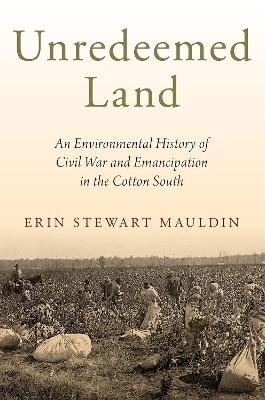
Unredeemed Land
An Environmental History of Civil War and Emancipation in the Cotton South
Seiten
2022
Oxford University Press Inc (Verlag)
978-0-19-756344-1 (ISBN)
Oxford University Press Inc (Verlag)
978-0-19-756344-1 (ISBN)
Unredeemed Land examines the ways the Civil War and the emancipation of the slaves reconfigured the South's natural landscape, revealing the environmental constraints that shaped the rural South's transition to capitalism during the late nineteenth century.
How did the Civil War and the emancipation of four million slaves reconfigure the natural landscape in the South and the farming economy dependent upon it?
An innovative reconsideration of the Civil War's profound impact on southern history, Unredeemed Land traces the environmental constraints that shaped the rural South's transition to capitalism during the late nineteenth century. Dixie's "King Cotton" required extensive land use techniques across large swaths of acreage, fresh soil, and slave-based agriculture in order to remain profitable. But wartime destruction and the rise of the contract labor system closed off those possibilities and necessitated increasingly intensive methods of cultivation that worked against the environment. The resulting disconnect between farmers' use of the land and what the natural environment could support intensified the economic dislocation of freed people, poor farmers, and sharecroppers. Erin Stewart Mauldin demonstrates how the Civil War and emancipation accelerated ongoing ecological change in ways that hastened the postbellum collapse of the region's subsistence economy, encouraged the expansion of cotton production, and ultimately kept cotton farmers trapped in a cycle of debt and tenancy.
The first environmental history to bridge the antebellum, Civil War, and Reconstruction periods, Unredeemed Land powerfully examines the ways military conflict and emancipation left enduring ecological legacies.
How did the Civil War and the emancipation of four million slaves reconfigure the natural landscape in the South and the farming economy dependent upon it?
An innovative reconsideration of the Civil War's profound impact on southern history, Unredeemed Land traces the environmental constraints that shaped the rural South's transition to capitalism during the late nineteenth century. Dixie's "King Cotton" required extensive land use techniques across large swaths of acreage, fresh soil, and slave-based agriculture in order to remain profitable. But wartime destruction and the rise of the contract labor system closed off those possibilities and necessitated increasingly intensive methods of cultivation that worked against the environment. The resulting disconnect between farmers' use of the land and what the natural environment could support intensified the economic dislocation of freed people, poor farmers, and sharecroppers. Erin Stewart Mauldin demonstrates how the Civil War and emancipation accelerated ongoing ecological change in ways that hastened the postbellum collapse of the region's subsistence economy, encouraged the expansion of cotton production, and ultimately kept cotton farmers trapped in a cycle of debt and tenancy.
The first environmental history to bridge the antebellum, Civil War, and Reconstruction periods, Unredeemed Land powerfully examines the ways military conflict and emancipation left enduring ecological legacies.
Erin Stewart Mauldin is Assistant Professor of History at the University of South Florida. She is the co-editor of A Companion to Global Environmental History and book review editor of Agricultural History.
Acknowledgments
Introduction
Chapter 1: Deferring Crisis
Chapter 2: Revealing Vulnerabilities
Chapter 3: Intensifying Production
Chapter 4: Accelerating Change
Chapter 5: Facing Limits
Conclusion
Notes
Bibliography
Index
| Erscheinungsdatum | 15.01.2021 |
|---|---|
| Zusatzinfo | 17 hts |
| Verlagsort | New York |
| Sprache | englisch |
| Maße | 231 x 155 mm |
| Gewicht | 386 g |
| Themenwelt | Geisteswissenschaften ► Geschichte ► Regional- / Ländergeschichte |
| Geschichte ► Teilgebiete der Geschichte ► Militärgeschichte | |
| Naturwissenschaften ► Biologie ► Ökologie / Naturschutz | |
| Technik | |
| Weitere Fachgebiete ► Land- / Forstwirtschaft / Fischerei | |
| ISBN-10 | 0-19-756344-9 / 0197563449 |
| ISBN-13 | 978-0-19-756344-1 / 9780197563441 |
| Zustand | Neuware |
| Informationen gemäß Produktsicherheitsverordnung (GPSR) | |
| Haben Sie eine Frage zum Produkt? |
Mehr entdecken
aus dem Bereich
aus dem Bereich
neueste Manipulationstechniken als Waffengattung der NATO
Buch | Softcover (2023)
Westend (Verlag)
CHF 33,55
Deutschlands großer Volksaufstand
Buch | Softcover (2024)
Propyläen Verlag
CHF 30,80


